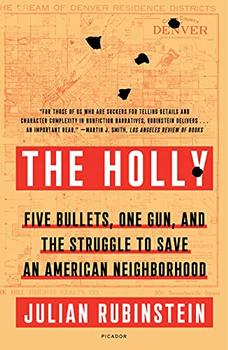Summary | Excerpt | Reviews | Readalikes | Genres & Themes | Author Bio

Five Bullets, One Gun, and the Struggle to Save an American Neighborhood
by Julian Rubinstein
The Watts Riots of 1965 in Los Angeles, sparked by a drunk driving arrest, had exploded because of frustrations in the African American community about housing, overcrowded schools, and a lack of jobs. Five days of mayhem, broadcast on national news programs, saw helmeted police with batons beating Blacks; looting; burning cars; and bodies in white sheets loaded into ambulances. Thirty-four African Americans died, nearly a thousand were injured.
Mayor Currigan had assured Denver residents that "Denver is not Watts," but he knew that racial tensions in northeast Denver were growing. While the KKK no longer held political office, a white supremacist organization that called itself the Minutemen—an offshoot of a Los Angeles group that terrorized Blacks—had announced its presence. Several members of Denver's District 2, the police substation that patrolled northeast Denver, were said to be members.
Ernestine began to see racial epithets on driveways and sidewalks. A religious woman, she shied away from politics and found solace in radio preachers. But other African Americans in the neighborhood were galvanized. Rachel Noel, a sociologist from Virginia, led a group of activists to bring their concerns directly to Mayor Currigan.
Soon after LBJ's visit, Currigan agreed to commission Noel's group, which became known as the Group of 15, to independently monitor the Dahlia. That summer, the Group of 15 witnessed a racially charged environment ruled by District 2 officers. Rattling nightsticks around the windows of cars in which youth were eating takeout from the hamburger stand, they addressed them with racial epithets, including "nigger." According to a report the group submitted, this often provoked youth to respond with their own insults. Sometimes they also threw rocks and bottles at the police. Their resulting arrests were carried out in brutal fashion. Some youth suffered severe head wounds.
Noel's commission reported that riots were barely averted. "Police action in Dahlia could have provoked serious complications if intelligent people who had knowledge of the problems that exist for these young people had not intervened," the scathing nineteen-page report delivered to Mayor Currigan stated. "The major problem facing minority youth is employment," the report stressed, a conclusion the Kerner Commission report on the Watts Riots reached the following year. Job prospects, the Group of 15 wrote, were severely hurt by the heavy policing of the neighborhood, and the many arrests for petty offenses like jaywalking or "using filthy language." Some youth were charged with false robbery or assault charges. "Police records are used to slam the doors of employment shut," the Group of 15's report said.
Urgent needs recommended by the report included job training—and a youth recreation center.
Excerpted from The Holly by Julian Rubinstein. Copyright © 2021 by Julian Rubinstein. Excerpted by permission of Farrar, Straus & Giroux. All rights reserved. No part of this excerpt may be reproduced or reprinted without permission in writing from the publisher.






The most successful people are those who are good at plan B
Click Here to find out who said this, as well as discovering other famous literary quotes!
Your guide toexceptional books
BookBrowse seeks out and recommends the best in contemporary fiction and nonfiction—books that not only engage and entertain but also deepen our understanding of ourselves and the world around us.